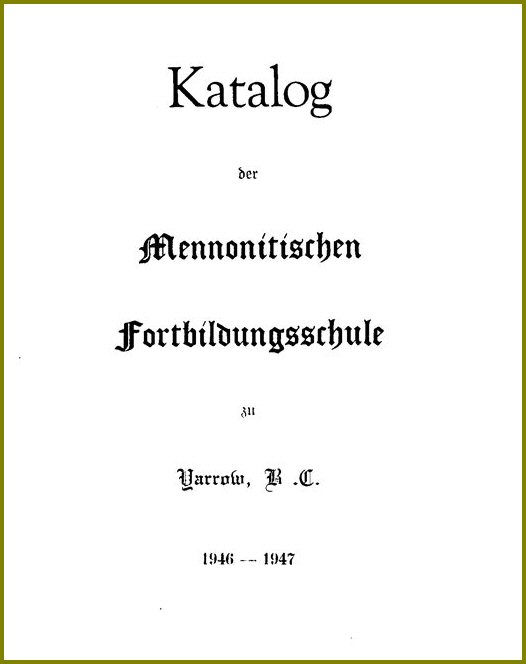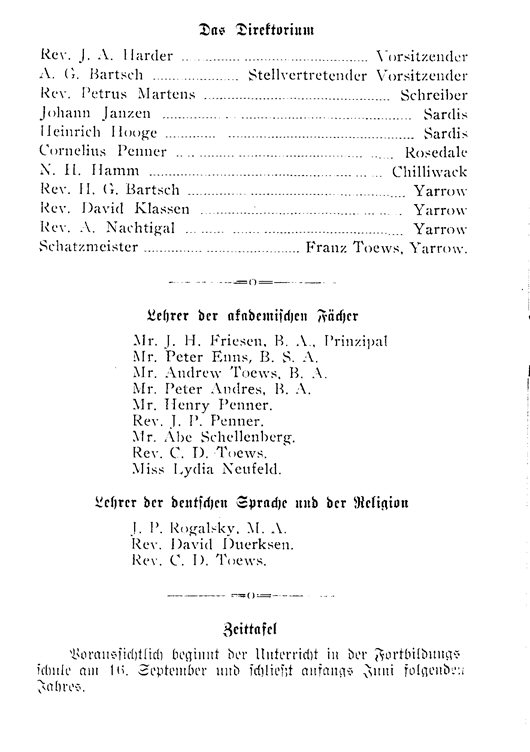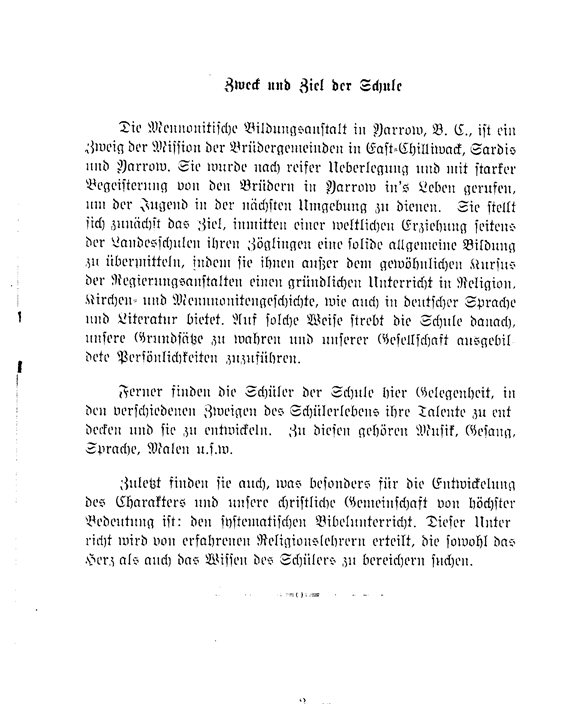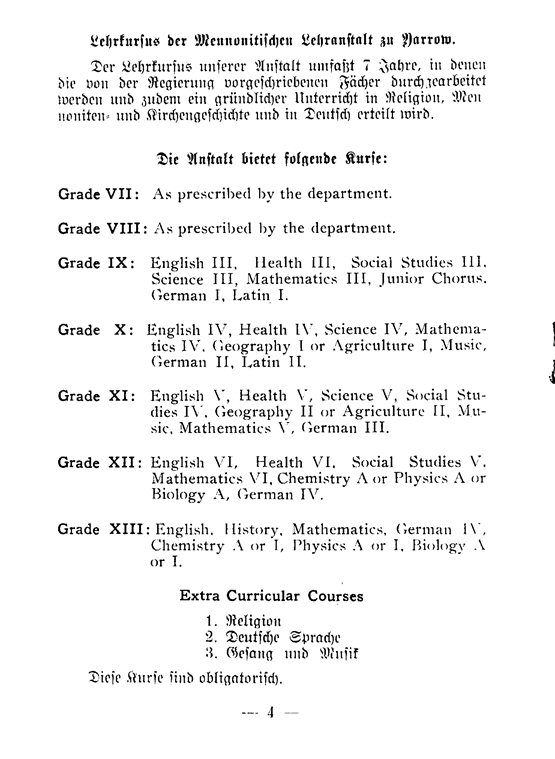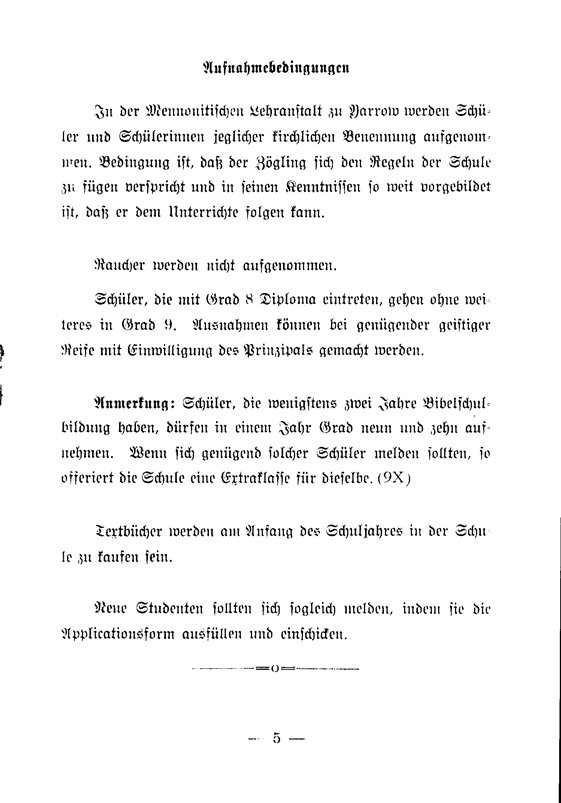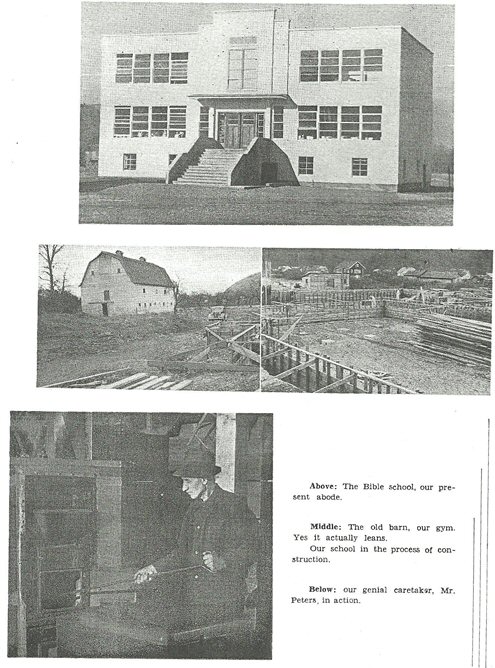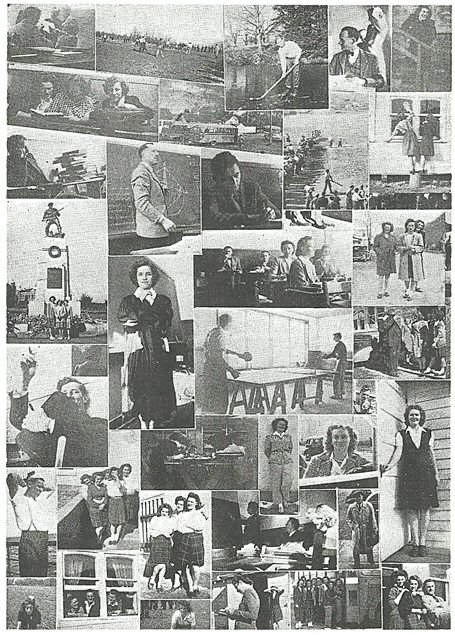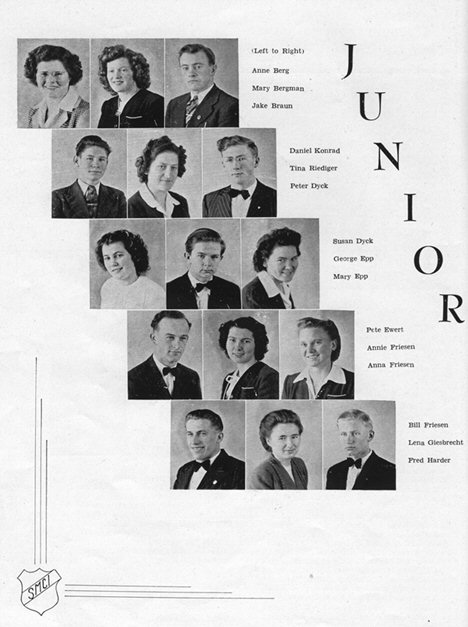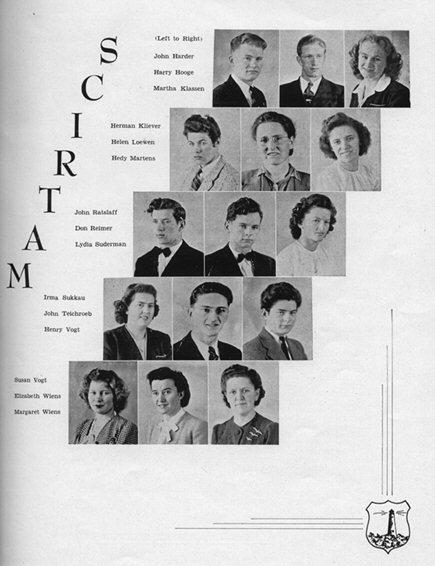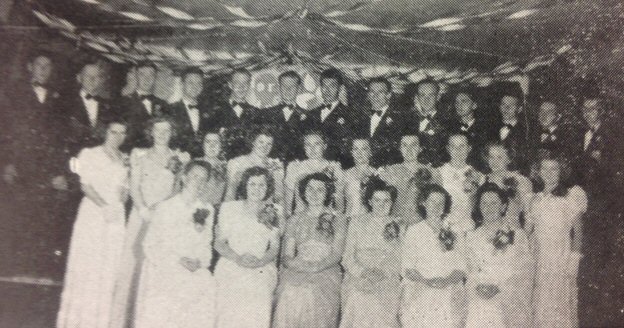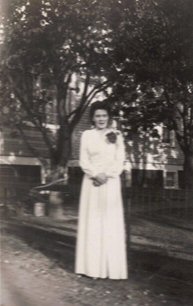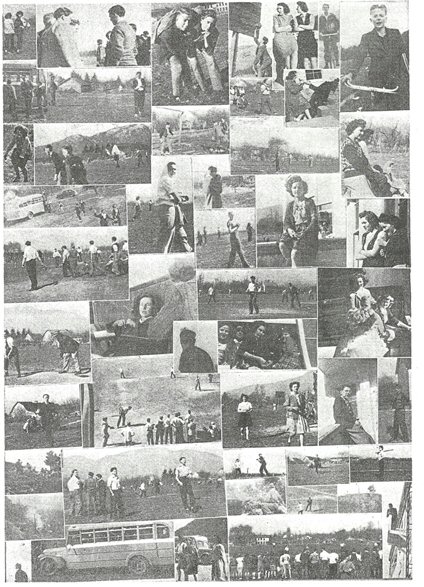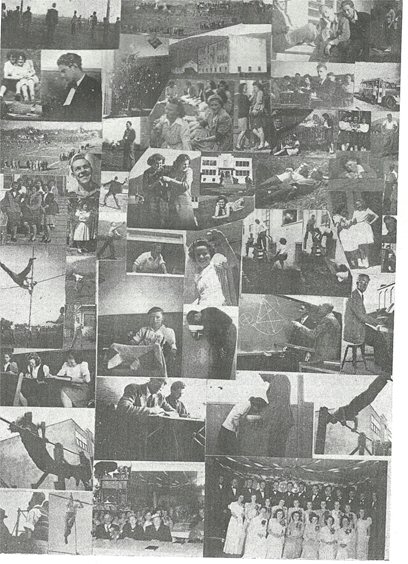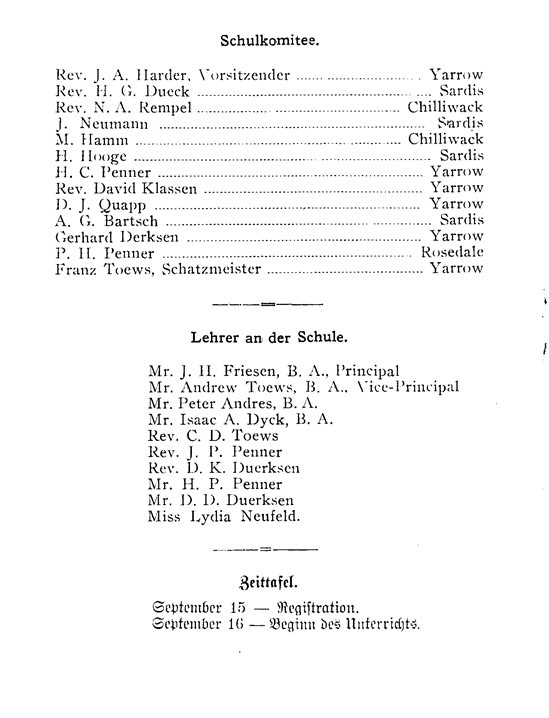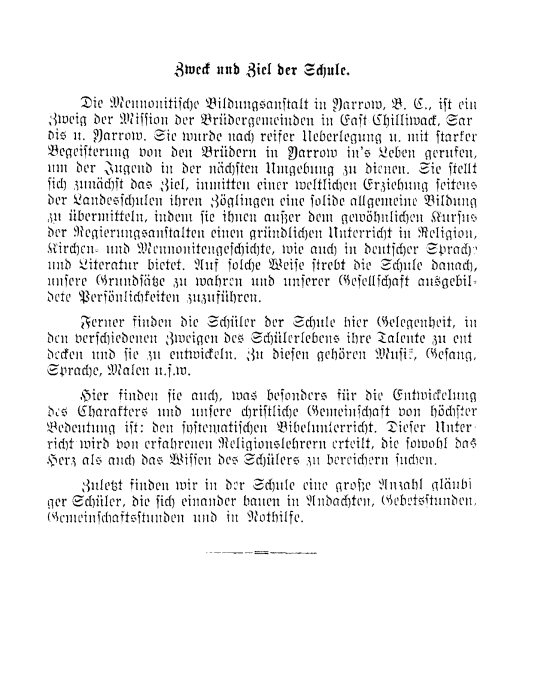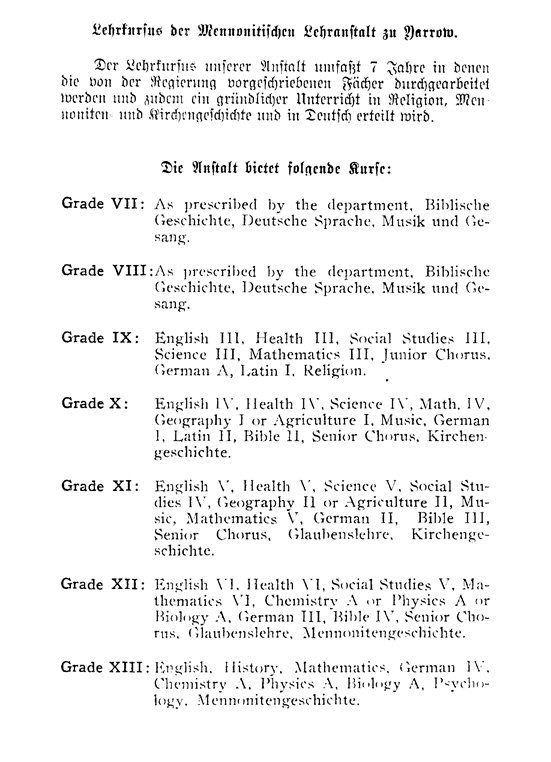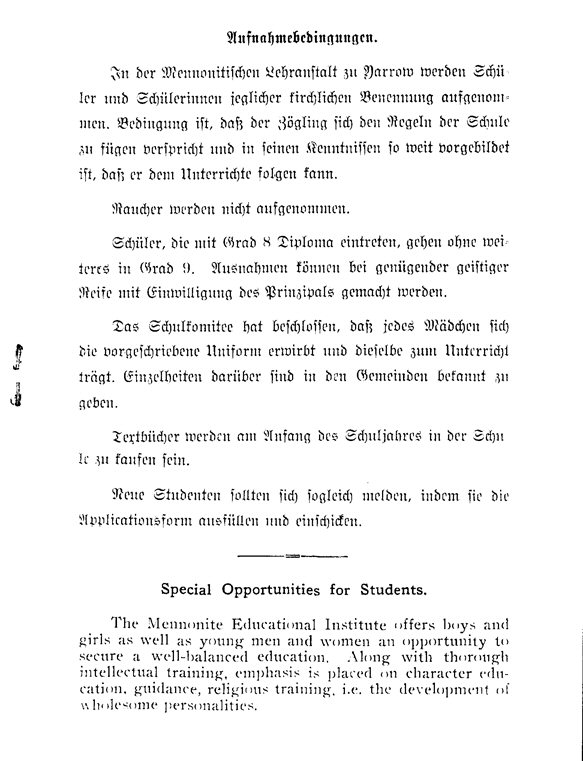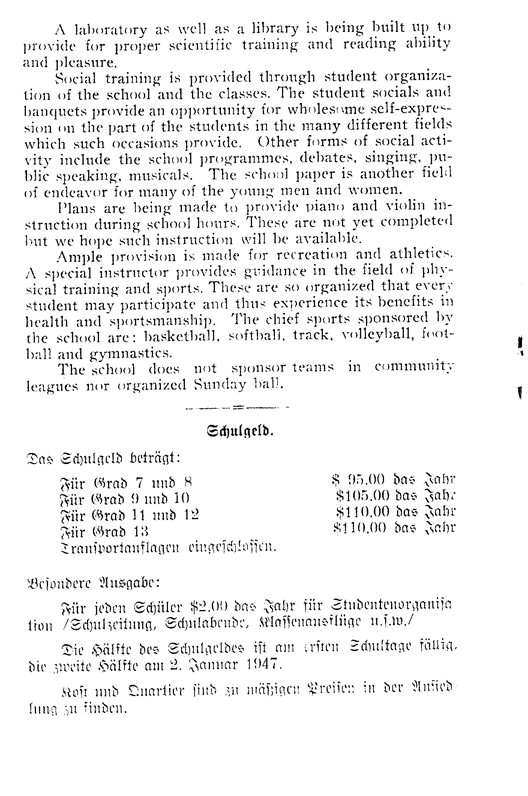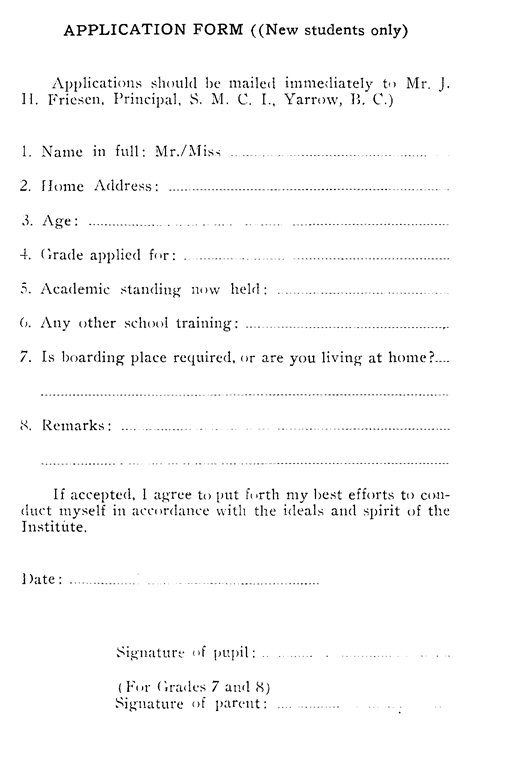|
Yarrow, British Columbia
Edited by
Esther Epp Harder, Edwin Lenzmann, and Elmer Wiens
Sharon Mennonite Collegiate Institute, Yarrow, B.C.
| Sharon Mennonite Collegiate Institute |
|---|
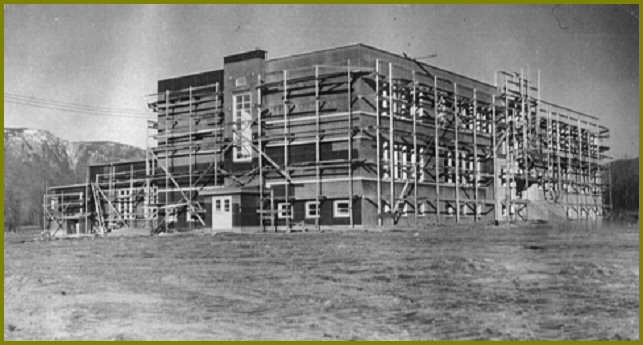 |
| Construction of the School on Wilson Road North |
|---|
|
— — — October 17 1946 - Chilliwack Progress - Front Page — — —
Religious, Academic Training Object of M.E.I.
Yarrow School Aims Cited
|
|
"The object of the Mennonite Educational Institute is to create a composite junior-senior high school which will give students thorough training in religion as well as a complete academic course."
This statement of the policy behind Yarrow's private school was given by Principal J.H. Friesen in an interview with The Progress.
Another contributing factor leading to the establishment of the school, Mr. Friesen says, was the policy of district school boards.
Until this year there has never been a teacher at Yarrow public school at Yarrow of the Mennonite faith, he stated and the reaction to that policy has had a bearing on the formation of the school.
Without a teacher of their own faith, older people felt that the children were being taken away from them and the only way they could change the situation was by instituting a private school.
According to Mr. Friesen, the provinces of Manitoba, Saskatchewan and Alberta pursue and entirely different policy in regard to Mennonite teachers.
Public schools in Mennonite districts there are staffed largely by teachers of the same faith, with the result that private schools have not figured as important elements in the educational picture.
The reason for this, Mr. Friesen says, is that people are satisfied with public schools staffed by their own people. He also assets that had the policy been pursued in Yarrow, he is certain a private
school could not have obtained the support of the community.
GROWTH OF SCHOOL
To trace the growth of the new school, Mr. Friesen goes back to 1944. At that time a school was built in Abbotsford for the Mennonite population there. To this school,
the Yarrow people sent some money and a few students but due to the distance involved, it wasn't a popular scheme as far as the Yarrow people were concerned.
Last year the Mennonite Brethren Church decided to start a school of their own and brought Mr. Friesen from Saskatchewan to organize it.
The original six-room school was composed of small one-story buildings behind the church, where grades nine to twelve were taught.
As the first year wore on, plans were made for a $125,000 structure to be built for the 1946 term but due to a shortage of building material, the plans were shelved.
To house the expected enlargement in classes and students though, the school board had to find other accommodation.
A six-room two-storey structure being built on the church property for the Bible Institute was taken over for the school for the new term.
This has allowed the school to almost double its capacity and there are now 330 students enrolled under 12 teachers. Grades 7 to 13 are included in the course.
Fifty-six students come from East Chilliwack. The same number came from Sardis and 214 live in Yarrow. The remainder are from outside the province.
Operating cost of the entire school is $25,000 a year, covered by student tuition fees. Capital outlay is raised by contributions form a church membership of 1200 people.
The school provided a university entrance curriculum with the addition of religious study. Ten per cent of the course is devoted to this subject and it is broken down into the study of Bible doctrine, Bible History, church and Mennonite history.
Stress is also given to the study of music and all students take part in the periods of choral singing.
Mr. Friesen stated that he is sorry that people have evidently mistaken the formation of the new school as an endeavor by the Mennonite community to isolate itself from the rest of the district.
"The Mennonite people do mean to isolate themselves," Mr. Friesen said, "and as far as nationalism is concerned, they have no other patriotism except to Canada."
"You must remember though," the principal continued, "that these people came out from Russia less than 25 years ago, and it is difficult for them to throw up their
own culture and habits in such a short period."
|
Sharon Mennonite Collegiate Institute, 1946-47
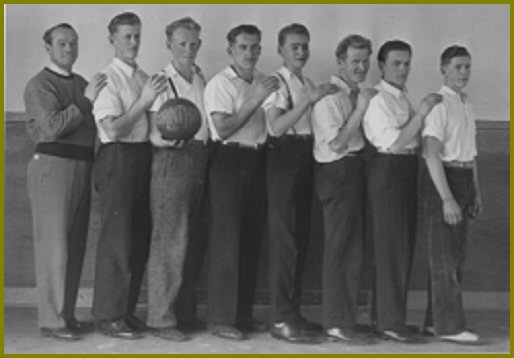 |
Peter Andres' Famous Basketball Team
Games were played in Henry Ratzlaff's barn below
Photograph Courtesy of Mary Ratzlaff Froese |
|---|
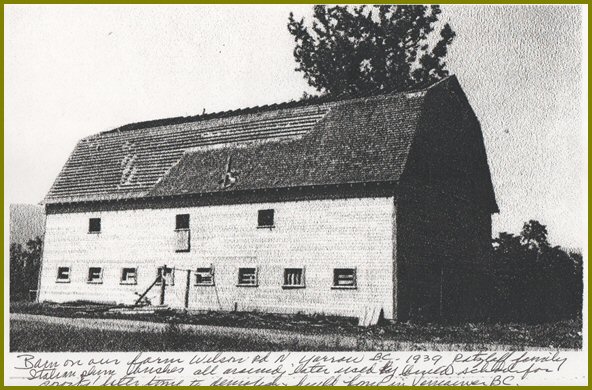
|
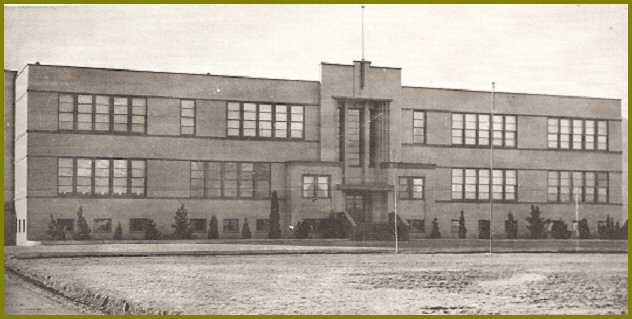 |
| SMCI Ready for Classes |
|---|
— — — The Chilliwack Progress, October 29, 1947 — — —
|
|---|
|
New Private School Opens
|
|
$150,000 Structure Has 320 Students
Sharon Mennonite Collegiate Institute — a $150,000 private school at Yarrow — opened its doors for the first time last week to 320 pupils from all over the Chilliwack area.
The institution, situated on an 11-acre site, is operating with 11 classrooms and workmen are completing the building while students carry on classroom in the completed sections.
Eleven teachers are employed. The principal is I. A. Dyck, formerly of Kitchener, Ontario.
Grades 7 to 13 are taught in the school and pupils are brought in four busses — one more is expected to arrive shortly — from Rosedale west.
Chief difference in the curriculum from public schools is:
(1) forty minutes of Bible study is given to every pupil every school day;
(2) German is taught as a foreign language instead of French
School spokesmen said that the range of courses was not as large as in larger schools , but in other respects the curriculum was the same.
The school, equipped with a forced draft ventilation system, has a coal stoker—hot water heating plant.
Modern Facilities
Individual chair type desks are in use. Blackboards are slanted outwards from
|
the top down and overhead lights are placed so that glare will be eliminated.
All told, the school has 14 classrooms, two laboratories, a library, rooms for home economics and manual training in the basement and an assortment of miscellaneous rooms for such purposes as private music teaching, which can be taken at the pupil's own expense.
A 60 feet x 80 feet gym adjoins the main school plant. Basketball, volleyball, badminton and table tennis facilities will be available soon, it is hoped. A large balcony at one end of the cement floor will accommodate an estimated 300 people.
The large school grounds will provide room for a soccer pitch, softball and baseball diamonds.
Reverend John Harder heads a nine-man school board administering the school.
The school was financed by voluntary contributions from church members. Maintenance charges will be met by tuitional fees of about $100 yearly charged each pupil. No municipal or provincial tax money is received.
While students and teachers of Sharon Mennonite Collegiate Institute waited for the completion of their new school, they used the Elim Bible School buildings situated on the grounds of the Mennonite Brethren Church.
Three hundred and twenty students and 11 teachers perfomed the big moving job last week when they moved into the new facilities.
|
|
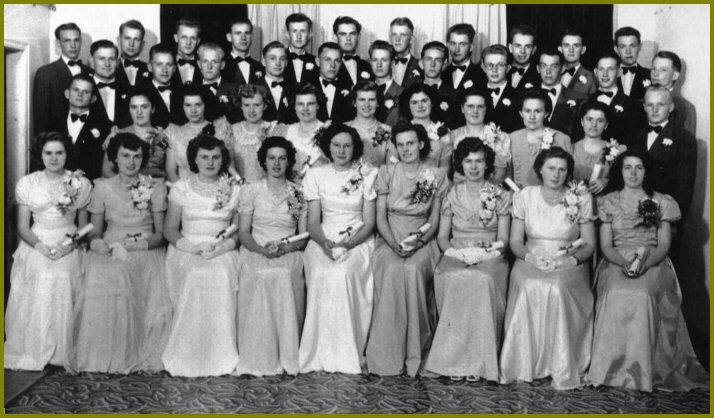 |
| Charter Graduation Class |
|---|
|
(back, l-r) Neil Klassen, Peter Funk, Ben Schmidt, Ed Krause, Bill Klassen, Jake Unger*, Peter Esau, Walter Friesen, Walter Friesen, Neil Toews, Walter Dyck;
(third row) Dave Rempel, Menno Unger, John Wiens, John Koop, Jake Kaethler*, Herman Neufeld, Hugo Friesen, Peter Neumann, Erwin Dahl*, Rudy Dyck, Wilmer Wiens;
(second row) John Wedel, Mary Isaak, Anne (Unger) Dahl, Mary (Wiebe) Unger, Sarah (Matthies) Staples, Lillian (Harder) Hartwell, Ann (Peters) Nightingale, Erna Block, Ann Neufeld, Ann (Isaak) Pederson, Peter Hamm*;
(front) Gerdie (Goossen) Funk, Susie (Wiebe) Van Lunzen, Mary (Goossen) Wiebe, Lydia (Schulz) Enns, Helen (Konrad) Knight, Leona (Rempel) Schmidt*, Lillian Harms, Erna (Epp) Lenzmann and Susan (Penner) Fedrau.
(* Deceased)
|
|
1999 Sharon MCI graduates celebrate reunion
Graduates of the class of 1949 at Sharon Mennonite Collegiate Institute held a reunion Sept. 7 in Chilliwack, B.C., marking their 50th anniversary. The school was initiated by Yarrow MB Church in 1945 after parents expressed concern that their children receive a Christian education. The school began on the church grounds, and was later transferred to new facilities on Wilson Road.
Students came mainly from Chilliwack, Greendale and Yarrow, many of them by car and later also by bus. By 1949, the economy in the area experienced a turndown due to the poor price of raspberries, and the school closed. In 1952, the Yarrow Church reopened it, and it continued until 1969, when it was permanently closed.
The 1949 class was the last to graduate from the original school. This grade 12 class was comprised of 36 students, but the graduation ceremonies also included six senior matric or grade 13 students
Attending the reunion were 21 of the 36 students, plus one senior matric grad. Special mention was made of Erwin Dahl, Peter Hamm, Jake Kaethler, Leona (Rempel) Schmidt and Jake Unger, who have since died. Also attending were two former teachers, Henry Penner and Peter Enns. After a meal, there was a time of informal sharing about family, work experiences, school memories and retirement activities.
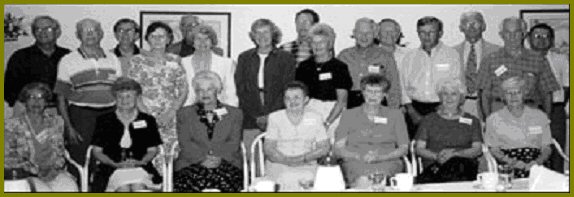
(back, l-r) Neil Toews, Neil Klassen, Hugo Friesen, Mary Wiebe, Walter Dyck, Lillian Harms, Helen Knight, Ben Schmidt, Lydia Enns, Rudy Dyck, Wilmer Wiens, Peter Neumann, Ed Krause, Peter Funk, John Wedel;
(front) Susan Fedrau, Ann Nightingale, Anne Dahl, Mary Unger, Erna Lenzmann, Erna Block and Gerdie Funk.
It was noted that almost half of this class chose teaching and related administrative responsibilities as their professions; others chose medical, accounting, homemaking and communications professions. They have reached retirement age, but are finding a fulfillment in a variety of volunteer activities in their local churches, with MCC and other organizations, and in travel. Keeping in touch with their children and grandchildren is the highest priority. Many expressed their thankfulness to God for His guidance and blessings throughout their lives.
- Hugo Friesen
|
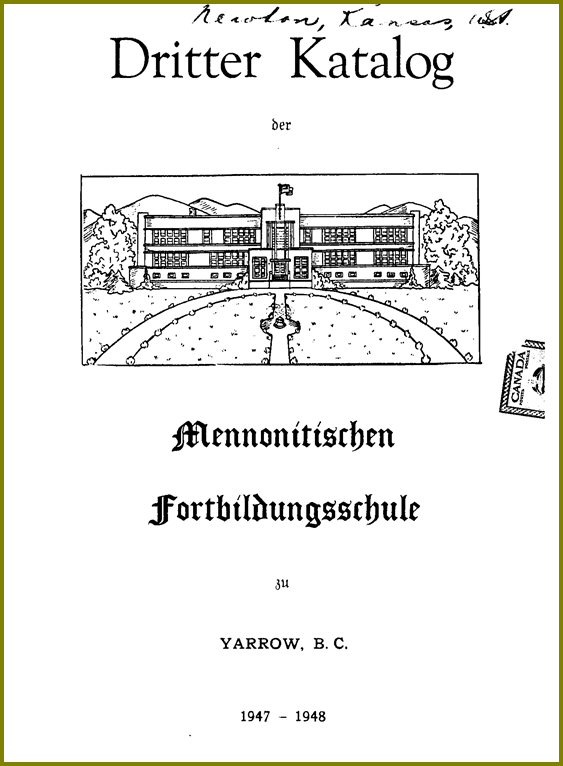
|
|
|
Yarrow SMCI Graduating Class of 1947-48
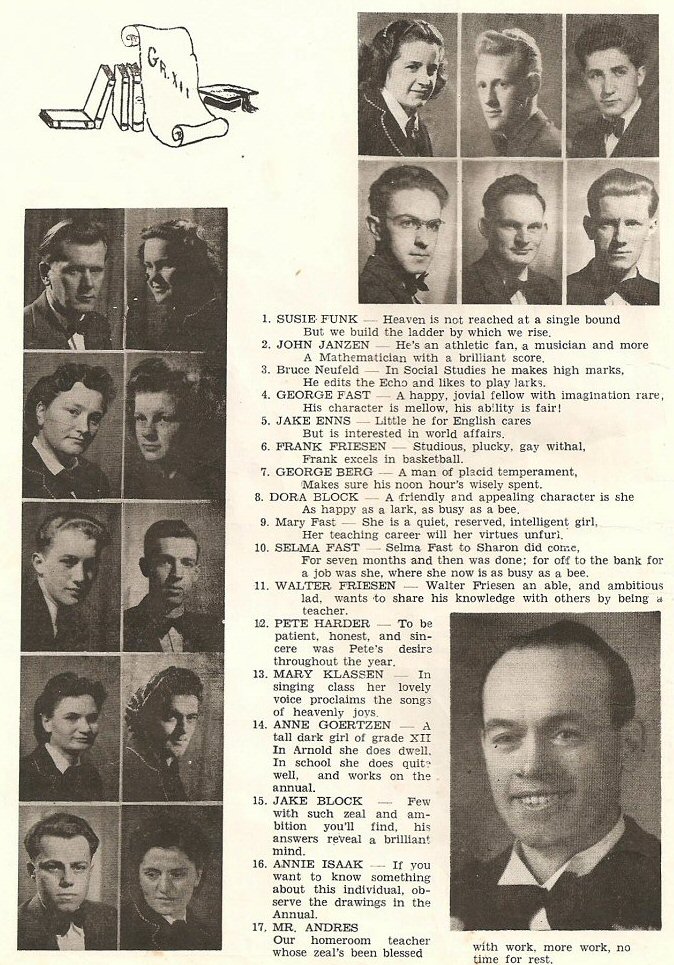 |
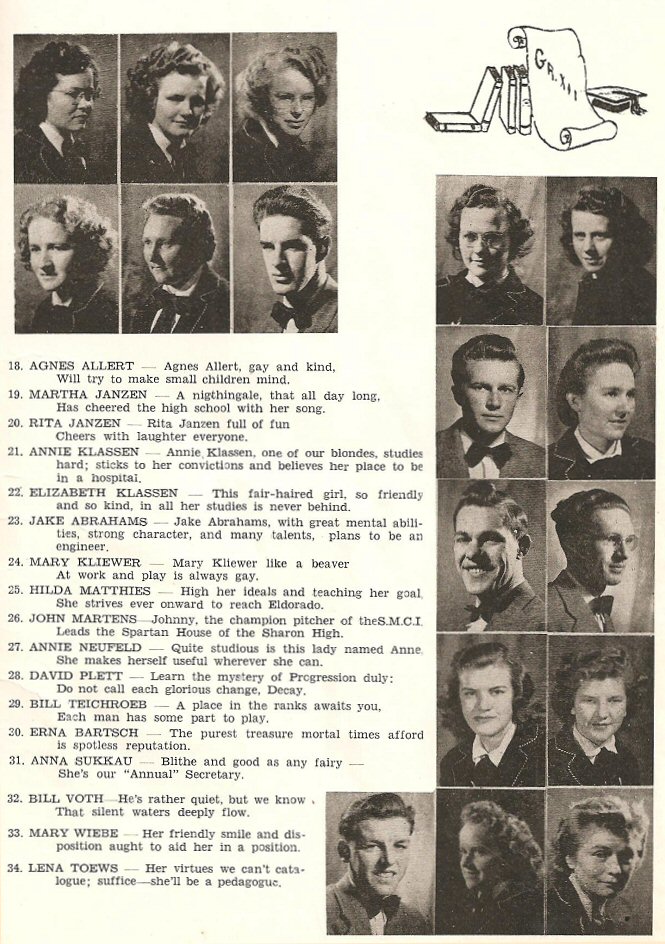 |
|
Sharon Mennonite Collegiate Institute (1945-1949) (Yarrow, British Columbia, Canada)
Giesbrecht, David. "Sharon Mennonite Collegiate Institute (1945-1949) (Yarrow, British Columbia, Canada)."
Global Anabaptist Mennonite Encyclopedia Online. 2009. Web. 09 May 2011.
http://www.gameo.org/encyclopedia/contents/sharon_mennonite_collegiate_institute_1945_1949.
Beginnings
The Sharon Mennonite Collegiate Institute (SMCI) enrolled its first students in 1945, one year after the Mennonite Educational Institute (MEI) was established in Abbotsford. Opening originally as the Mennonite Educational Institution, it adopted the name, Sharon Mennonite Collegiate Institute in 1947. A Biblical name, it was taken from Song of Solomon 2:1, "I am a rose of Sharon, a lily of the valley." Due to the Depression and the rigorous demands of establishing an immigrant settlement, only a few of Yarrow's Mennonite youth attended high school during the 1930s. In addition, many believed that the Chilliwack High School did not provide a safe environment, physically, culturally and religiously, for the Mennonite youth. Following Abbotsford's establishment of its school, Yarrow, under the leadership of Johannes Harder, quickly moved to establish its own high school.
Wartime building restrictions, limited finances, and lack of faculty necessitated combining, at first, the Bible and high schools. On 24 September 1945 the high school opened with six teachers, including Jacob Friesen from Wymark, Saskatchewan, as principal, and 150 students, enrolled in grades nine to twelve. Due to wartime restrictions on issuing building permits, the schools were temporarily housed in several buildings on the church grounds.
Expansion
The school committee moved quickly to address questions of future growth. One was to add grades seven, eight and thirteen. Consequently, enrollment more than doubled in 1946; thereby, compounding space problems. Plans were implemented to erect a high school building on a 10-acre plot on Wilson Road, which had been donated to the Yarrow church by Franz Friesen of Morden, Manitoba. Faculty and students were finally able to move into a new 13-classroom structure on October 1947. The Sardis, East Chilliwack and Chilliwack Mennonite Brethren Churches joined in the school project, necessitating the purchase and lease of several buses. With an enrollment of over 300 students in 1947 and the support of several churches, the school's future seemed assured.
Philosophy and Purpose
The purposes of the school, as enunciated by School Board members, teachers and parents was to provide post elementary education within a Christian and sheltered environment. Some, like Johannes Harder, hoped to reproduce the Zentralschule they had known in Russia, one integrating secular and religious education.
The school's founders envisioned a special kind of Christian school, one that would preserve and transmit the settlers' Mennonite heritage. This included several aspects. One was staffing: only Mennonite teachers would be hired. Another was physical separation: the school was built in a Mennonite village, symbolizing separateness when it came to ethnic and religious identity. Furthermore, morning chapel and an expanded curriculum including courses in religion, Mennonite history and German placed spiritual development and Mennonite identity formation in the forefront.
Curriculum
The curriculum included the provincially prescribed courses for junior and senior high schools. While a business course was being planned in 1948, and industrial arts and Home Economics were taught, the academic subjects of languages, history, mathematics, science and music retained their central position throughout the school's brief existence.
In addition to the prescribed programs, religion and German were emphasized. In the 1946-1947 school year, all junior high students enrolled in five periods of religion per week. Senior high students enrolled in Biblical and Church History, English Bible, Christian dogma, Church History, and Mennonite History. The importance of German was recognized by students enrolling in German classes and by faculty teaching most religion classes in the German language.
Faculty and Administration
The school itself was an institution established by and answerable to the supporting churches. In August 1945, the Yarrow MB Church temporarily combined its Bible school and High school boards, forming one school committee (Schulkommittee). Once Sardis, East Chilliwack and Chilliwack joined the project, each sponsoring church elected representatives to serve as members on the Board. Approximately 40 percent of the Board members came from Yarrow, the remainder from the other three churches. Throughout its history, the Board had only one chairman, Johannes Harder of Yarrow. Johannes Harder of Yarrow served throughout the schools brief existence, its only chairman and remained one of its greatest advocates.
Two individuals served as principal of the school. Jacob Friesen was appointed principal during the first two years of the school's existence and Isaac Dyck for the remaining two years.
The faculty included both individuals who had received most of their education in Russia and several who had attended North American institutions. In any given year, less than 50 percent of the faculty held Bachelors degrees. Those who did usually taught the upper grades, especially grades 12 and 13, in order to prepare students for the provincial exams. Others like C. D. Toews and C. C. Peters made their mark in promoting music, German and religion.
In the spring of 1949, the SMCI School Board, unable to meet it financial obligations, turned the school over to the Chilliwack School Board. The latter retained the teachers for the remainder of the school year and paid their salaries. Ironically, the Chilliwack Board, never a supporter of the school, now became its official governing board.
Students
The student population was drawn primarily from the Mennonite Brethren families in Yarrow, Sardis, East Chilliwack and Chilliwack. Its opening day enrollment of 150 students had increased by the winter of 1947 to 360 students, only to drop within two years to 225. A special feature was Grade 9X, designed for non-traditional students, those who had dropped out of school for a number of years. Of the 13 students enrolled in Grade 9x in 1945-46 school year, nine were promoted to Grade 11 and four to Grade 12 the next year. In March 1946, the 151 students ranged in age from 13 to 27. Fifty had previously attended Bible School. Of 333 students who attended SMCI and for whom records were available, some 70 percent were born in the Prairie Provinces: Sakatchewan (98), Manitoba (80), and Alberta (56). Sixty-eight had been born in British Columbia and some 22 had been born in Russia. Over 96 percent listed Russia as their parents' place of birth, making it truly a Russlšnder's institution.
Closing
The school's fortunes reversed markedly in 1948. The Sardis community experienced a major flood in late spring. The Mennonite Central Committee assisted by contributing some money to help defray tuition costs for students from flooded areas. Later that summer, the raspberry market collapsed, forcing the Yarrow's Co-op into bankruptcy and leaving most growers with little or no money for their crops. The Board, saddled by building debts and a declining enrollment, soon found itself unable to pay the teachers' salaries. The school itself had never won support from all the church members. Economic reversals served to bring these tensions out into the open. The Chilliwack School Board agreed to pick up the teachers' salaries for April to June, after which time the school closed. Chilliwack finally purchased the school in 1952 at a discounted price of $60,000.
Bibliography
Dahl, Edward H. "Sharon Mennonite Collegiate Institute: 1945-1949. A History" Unpublished paper, University of British Columbia, 1968.
Klassen, Agatha. Yarrow: A Portrait in Mosaic. Yarrow, BC, 1976.
Neufeldt, Harvey. "The Education of the Yarrow Mennonite Community, 1928-1960," Historical Studies in Education 7 (Spring 1995): 71-95.
"Sharon Mennonite Collegiate." Konferenz Jugendblatt (May-June, 1952): 11.
|
| The Chilliwack Progress January 26, 1949 |
|---|
|
Chilliwack School Board Considers Offer
MAY SELL SMCI TO DISTRICT
A move that will "have a major influence on the educational system in the Chilliwack district" is seen in the suggested sale of Sharon Mennonite Collegiate Institute to school district 33.
A six-man finance committee has been appointed by SMCI to negotiate the sale with district 33 school board.
However not all directors of the Yarrow private school appear to favour the sale. Directors are meeting tonight while final decision on the proposed sale is not expected to be reached before next week, a spokesman said.
Decision of the majority of the board of directors to sell was traced to the difficult financial condition of SMCI. Some reports say the sponsors were forced to borrow heavily to partially complete the building. Sale was first suggested unofficially several months ago. Present negotiations-the first real step toward reaching a sales agreement-were started last week.
COST $170,000?
School board has hailed the proposed sale as a "great step forward in the development of our educational system." A bylaw would probably be required to sanction any move by district 33 trustees to buy the building. Department of education appears to favour purchase of the building which has been built to standard specifications.
Still not completed, the 13-room SMCI has cost fours Mennonite parishes about $170,00, some observers estimate. Figure doest not include volunteer labour which accounted for almost all work done on the building.
Including scientific and assembly rooms, a large gymnasium and ground floor space for home economics and industrial arts classes, SMCI is seen as a future home for a Yarrow elementary-junior high school.
Faced with serious classroom shortage in the present Yarrow elementary school, district 33 school board has already provided temporary accommodation for three classrooms. Still in reserve is $29,000 for expansion of the building.
Trustees have been reluctant to spend more money on a school that has such a restricted playground area as does the Yarrow elementary. Sale of the school property, situated in downtown Yarrow on what is a classed as ideal business property, might raise considerable amount of money to go towards purchasing SMCI.
THE PRIVATE SCHOOL
SMCI is built on a spacious ten-acre site. Land would provide ideal playground accommodation for elementary and junior-high students.
Built in 1947 by parishioners of Mennonite Brethren Churches in Yarrow, Greendale and East Chilliwack, SMCI has an enrolment of 269 pupils in grades nine to 13. Students were brought by bus from throughout the district-as far east as Bridal Falls.
Yarrow elementary school has 255 students enrolled in seven divisions and including grades one to six. Last term 22 Sumas municipality students were attending the Yarrow school but accommodation shortage made it necessary for district 33 to reject the out-of-district pupils this year. Should Yarrow obtain a new and larger school-such as SMCI-it is likely the Sumas youngsters, who live just outside of Yarrow on the other side of Boundary road, would return to this district for their schooling. Their tuition is paid for by the Sumas school board.
SEEK BRIDGE?
Establishment of a junior high school in Yarrow would also mean improvement of district's senior grade education system. Only Chilliwack Junior High School, with some grades housed in Central elementary school, provides junior high instruction.
Opening of grades seven to nine at Yarrow would greatly relieve crowding at the Chilliwack institution; at the same time provide a more central high school for Yarrow and Greendale students.
With this in mind, school board may see completion of a B.C. Electric trestle over the Vedder in the southeast end of Greendale. Planking of the narrow bridge would permit school busses to transport junior high students directly from Greendale-Atchelitz area into Yarrow. Trestle comes out on the Yarrow side at Lumsden road. SMCI is on Wilson road north.
Likely to pose a problem should SMCI be sold to the district is the standing of eight teachers in the private school. None of them have B.C. teaching certificates. Some of the teachers specialized in German and religious instruction might not be able to fit into the district educational system.
|
| The Chilliwack Progress February 9, 1949 |
|---|
|
SMCI Sale Arranged
Steps to incorporate Sharon Mennonite Collegiate Institute building at Yarrow into Chilliwack district 33 school system are being arranged this week.
Department of education officials are arriving Monday to assess the building. As the government will pay half the purchase price, Victoria must give its estimate on the sale price of the building.
Details of the sale may take weeks to complete. Building will not likely be occupied by district 33 students until September.
SMCI directors have stated the building is definitely for sale, have asked district 33 school board to start drawing up a sales' agreement. No price has been set. Original estimates of the cost of the building alone, apart from voluntary labour were over the $125,000 mark.
Once a sales agreement has been drawn up, school board will prepares a money bylaw for submission to district ratepayers.
|
| The Chilliwack Progress March 23, 1949 |
|---|
|
Yarrow Students Stage Play
Students of the SMCI presented a play entitled "Esther Reid". Some 1000 people packed the auditorium. Collection for the evening amounted to over $400. School Choir selections under the direction of music teacher C.D. Toews provided pleasing entertainment during the intermissions.
The three-act play was ably presented by the following students: Mary Klassen, grade XI; Velma Penner, grade XI; Helen Duerksen, grade XI; Minnie Plett, grade VII; Henry Klassen, grade VII; Bertha Loewen, grade XI; John Wiens, grade XII; Cornelius Toews, grade XII; Annie Schellenberg, grade XI; Walter Dyck, grade XII; Herman Neufeld, grade XII; Mary Reimer, grade XI; Ben Schmidt, grade XII; Walter Friesen, Grade XIII, Peter Hamm, grade XII. Decorations committee included Lily Harder, Annie Neufeld, Walter Friesen and Cornelius Toews. Rev. D.K. Duerksen was in charge.
Proceeds will go to the students Benevolent Fund. Several students in Paraguay will benefit directly as a result of the fund. Arrangements are being made to pay tuition fees for deserving students in Paraguay.
Betty Reimer, daughter of Mr. & Mrs. P.E. Reimer entertained her young friends at a birthday party Sunday afternoon. Birthday cake with eleven candles decorated the center of the table. Present were Mary Regehr, Mary Reimer, Betty Ann Nikkel, Agnes Braun, Elsie Braun and Viola Heinrichs.
A social evening recently sponsored by the Ladies' Sewing Circle was well attended. P.H. Andres assisted with the showing of films. A buffet supper and auctioning of cakes at the conclusion of the program netted about $190. Money will go to needy widows in Paraguay settlement. Door prize was won by Mrs. P.H. Andres.
|
| The Chilliwack Progress March 30, 1949 |
|---|
|
Re-open SMCI Sale Discussion
School Board Meets Tonight: First Offer For School Rejected.
District 33 school Board will re-open discussion on proposed purchase of Yarrow's Sharon Mennonite Collegiate Institute at a meeting tonight.
Negotiations stared several months ago, broke down last week when SMCI finance committee turned down school board's first offer. Figure suggested was well under the $100,000 mark.
Mennonite churches which built and have operated the school will give up control of the institution April 1. District 33 will operated the school, pay operating expenses until end of the current term. Mennonite churches will retain ownership until a sales agreement is reached.
Regular government grants for school operation, teachers' salaries and bus transport will be paid district 33 as operators of SMCI, board states.
There will be few changes in the school setup during the balance of the term. Classes with the exception of religious instruction during regular school hours will not be altered. Present teacher staff will be retained.
School board will continue to haul students from Bridal Falls and intermediate points to Yarrow, just as SMCI had done. Yarrow students who had been attending high school in Chilliwack will continue to do so until June, school board states pointing out it would cause unnecessary confusion to attempt major alterations at this late date.
School board must convince city and township councils of the need for additional high school space in the district. Trustees state there is no room in Chilliwack Junior Senior High school for the students now attending SMCI, maintain district has no choice but to purchase the Yarrow institution. If councils approve, a bylaw will be presented for purchase of the school.
|
| The Chilliwack Progress July 13, 1949 |
|---|
|
$80,000 At Stake
School Bylaw Vote Slated Saturday
Ratepayers of Chilliwack and district will go to the polls for the third time in a month when they vote for or against an expenditure of $80,000 to purchase Sharon Mennonite Collegiate Institute, Yarrow. If the bylaw is passed the provincial department of education will match the amount with a grant of $80,000.
A public meeting of Township and City ratepayers will be held tonight in City Hall at 8pm to discuss with school trustees proposed purchase of the school.
Indications are that the vote will be light as it comes at a busy time for farmers.
Voting is from 8 am to 8 pm. Ratepayers will mark ballots "yes" or "no". Results will be released as ballots are counted Saturday night.
A three-fifths majority of total votes cast is needed to carry the bylaw. Township is responsible for $52,744 the city $23,888 and rural area $3,368. Fate of the bylaw will be determined by total votes cast.
SMCI was started in 1945 in what is now a Bible school at Yarrow. One year later the present school of 16 rooms was built. No government grants were given to the Yarrow trustees and Ratepayers there also paid taxes for the operation of schools in district 33.
A Mennonite school south of Abbotsford, built one year prior to the founding of the Yarrow school and under similar circumstances is still in operation.
School district 33 has been operating the school since April 1. The Yarrow school was built and operated by four Mennonite churches at Yarrow, East Chilliwack, Chilliwack and Greendale. Negotiations for its sale began during the last week of January when costs of finishing and operating the school became too great. About 250 pupils attended last year.
Polling booths will be set up at City Hall, Chilliwack, the house of Mrs. L. Besette, Popkum; school house Columbia Valley; Cheam View Coffee Shop at Cheam View.
Municipal Hall, Chilliwack will be a polling stations as will the Community Hall, Fairfield Island; WI Hall, East Chilliwack; Community Hall, Ryder Lake; Public School, Yarrow; Community Hall, Rosedale; Cheam Church Hall, Cheam; Community Hall, Atchelitz; Community Hall, Sardis; and Public School, Sumas Prairie road.
|
| The Chilliwack Progress July 20, 1949 |
|---|
|
Business is Brisk At Yarrow
Business is picking up in Yarrow.
Cheered by ready markets for fresh and processed raspberries and prospects of early payment for first shipments, the economic situation at Yarrow is quickly improving.
It is anticipated that some payments will be made for shipped crates by the end of the month. This will help pay expenses and encourage pickers.
Reports also are current that another small payment will be made in the near future for 1948 crop.
Rainy weather is causing a temporary halt to shipments of fresh raspberries from Yarrow. More jam berries will now be packed, some in metal containers for quick freeze, others to be processed in SO2 as jam berries. Plants are still filling orders.
Reaction to the failure of the recent school bylaw has been philosophical.
Majority of the local population would have liked to have the problem settled, in hopes that a uniform and perhaps more economical system of education would have resulted for students.
No comments were available from local officials of the institute as to future plans of operation. It seems at the moment that large numbers of students will have to be transported to schools elsewhere. Residents definitely expected that the school would be sold and reiterate that the price was far below the actual cost of construction.
Yarrow has not yet had street lights installed along the main artery of communication and traffic - Central Road. The project was originated some time ago. Lights on side streets were installed. Central street lighting called for more modern fixtures which may be delaying completion of work.
|
|
|---|
|
Editorial The Chilliwack Progress
Where Now?
The ratepayers of school district 33 Saturday turned down the school board's proposal to purchase the Sharon Mennonite Collegiate Institute, thereby leaving the board and educational situation here in a pretty pickle.
The hunt for a goat on which to tie the defeat of the bylaw is now on. Farmers were busy cleaning up their haying; town people were busy holidaying or handling the Saturday trade; many people who were for the bylaw didn't turn out to vote because they thought it would pass; in districts where predominately Mennonite populations might have expected to roll up a favourable vote there was either a small vote or a negative one. The fact that the bylaw vote was one of the lightest on record also indicated an indifference on the part of the public against which there was little counteracting, organized effect.
Whatever the reason, the bylaw was rejected. It will probably be submitted again and until it does receive endorsation, the alternatives are likely to be mostly measures of expediency. Sincere as many an individual's resentment against school costs and higher taxes may be, a vote against Saturday's bylaw was in the same classification as cutting of one's nose to spite his face.
When the taxpayer is brought face to face with the additional costs which will be required by a temporary program; plus the costs of a long term program, he can't say that he wasn't warned. It isn't a pleasant prospect and is even less so for the person who didn't vote or voted against the bylaw. But all of us will have to share the additional burden.
|
|
|


